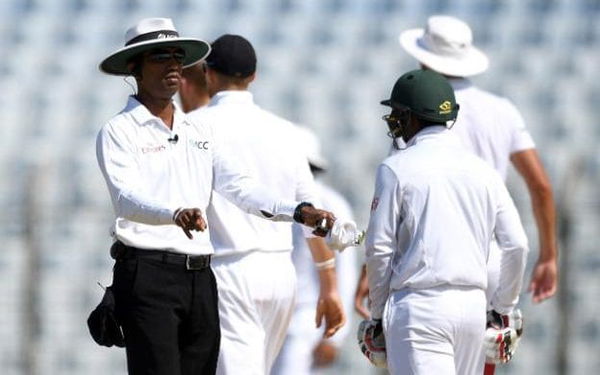

The Umpire Decision Review System is a technology based system used in the sport of cricket which was first introduced in 2008 in a test match between India and Sri Lanka. Its sole purpose was for reviewing controversial decisions made by the on-field umpires as to whether or not a batsman had been dismissed. But now it is being used in a fully fledged manner in tests and ODIs with the plan of introducing it in T20s in progress.
India started using DRS with the commencement of the home season and haven’t been particularly good at it. Due to lack of support from team members on the field, team India’s record has been abysmal with the DRS. It seems as if team India always ends up on the wrong side of umpire’s call for which the blame is on them for not taking it at the right time. Hence, they have been losing their reviews very quickly.

via Imago
pic credits- www.hindustantimes.com
However, DRS has had its own problems. There were two dismissals in particular that caught everyone’s eye in the recently concluded India vs Australia match from Bangalore, Kohli’s and Warner’s dismissal. It was the second ball of the 35 over from Hazlewood in India’s second innings when he got Kohli trapped in front of the wickets. Although, Kohli immediately reviewed the decision indicating that the ball had hit the bat before it went on to hit the pad. The mater was handed over to the third umpire who, after having a look at it a number of times, couldn’t conclusively say that it was bat first. The impact was umpire’s call and the ball went on to hit the stumps and Kohli was given out.
ADVERTISEMENT
Article continues below this ad
http://www.hotstar.com/sports/cricket/india-vs-australia-2017/m182347/match-clips/hazlewoods-667-torments-india/2001902184
ADVERTISEMENT
Article continues below this ad
David Warner was given lbw to Ashwin in Australia’s second innings with Australia chasing 188 to win the match. While attempting a sweep, Warner was trapped on the pads and was given out on field. Australia took the review and the matter went to third umpire. The ball seemed to have struck Warner outside off to the naked eye before ball tracking was used. The ball tracker however showed that it was umpire’s call on both the impact and hitting the stumps and according to the rules, Warner was sent back to the pavilion.
http://www.hotstar.com/sports/cricket/india-vs-australia-2017/m182437/match-clips/ashwin-destroys-oz-with-641/2001902202
What we see in both the dismissals is that there was no conclusive evidence that Kohli and Warner were certainly out. While there was no conclusive evidence that the ball had hit the bat first in Kohli’s case, there was too much scope for error in Warner’s case. I agree that the decision should be in the hands of the umpires as much as possible, but both Kohli and Warner were not wrong in taking the review which was evident from the replays. But they still lost their reviews. Australia didn’t take the review for Shaun Marsh that day because they had only one review left and they were skeptical that if they lose this review, they will be left with none. This is the pressure that the team feels once they lose the review.
ADVERTISEMENT
Article continues below this ad

via Imago
pic credits- www.indianexpress.com
DRS is going through a rough patch. A lot of problems are coming up. The Board of Control for Cricket in India even feels that it is killing the spirit of the game, which in a sense is right. The International Cricket Council needs to bring in some changes in the system for it to last. Firstly, they need to somehow bring the benefit of doubt back to the batsman from the umpires which is traditionally what has been happening in the game. Secondly, the team shouldn’t lose their review if either of the impact or hitting the stumps is umpire’s call as the teams are entirely not wrong reviewing the decision because otherwise they lose their review which adds to the pressure as teams only get 2 in 80 overs in tests and 1 in 50 overs in ODIs. Also, the parameter for umpire’s call should be changed because if the technology is so reliable, we should depend on it a little bit more. The ICC has to act fast otherwise the opposition for DRS is going to increase which is not good for the system.
ADVERTISEMENT
ADVERTISEMENT
ADVERTISEMENT
ADVERTISEMENT

